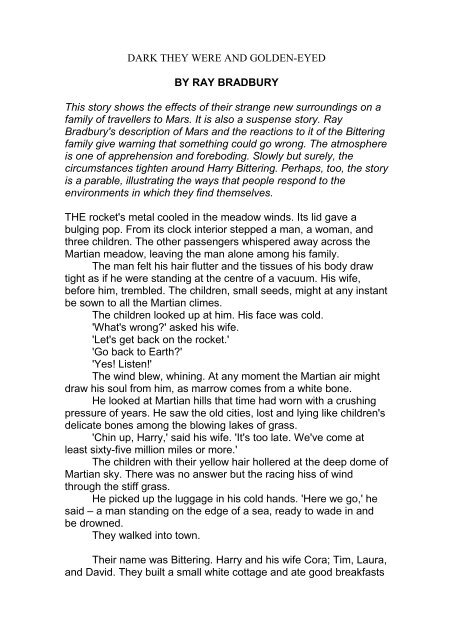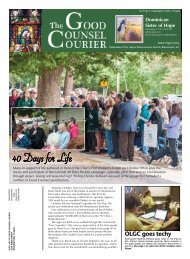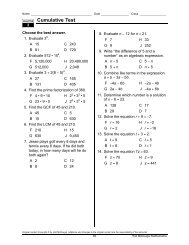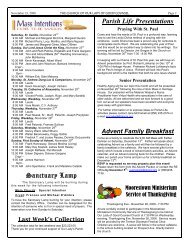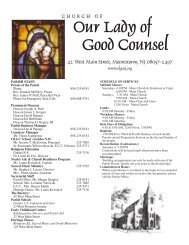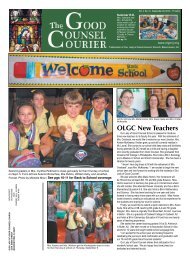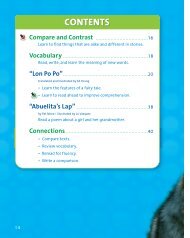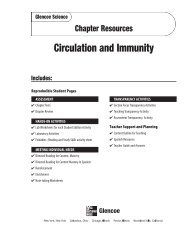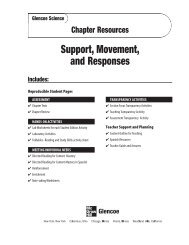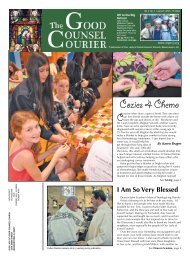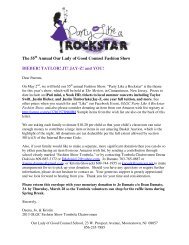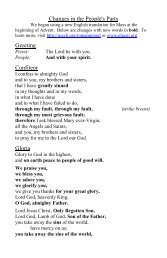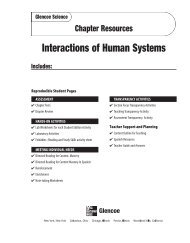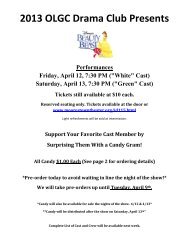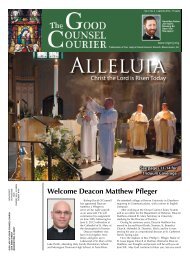DARK THEY WERE AND GOLDEN-EYED
DARK THEY WERE AND GOLDEN-EYED
DARK THEY WERE AND GOLDEN-EYED
You also want an ePaper? Increase the reach of your titles
YUMPU automatically turns print PDFs into web optimized ePapers that Google loves.
<strong>DARK</strong> <strong>THEY</strong> <strong>WERE</strong> <strong>AND</strong> <strong>GOLDEN</strong>-<strong>EYED</strong><br />
BY RAY BRADBURY<br />
This story shows the effects of their strange new surroundings on a<br />
family of travellers to Mars. It is also a suspense story. Ray<br />
Bradbury's description of Mars and the reactions to it of the Bittering<br />
family give warning that something could go wrong. The atmosphere<br />
is one of apprehension and foreboding. Slowly but surely, the<br />
circumstances tighten around Harry Bittering. Perhaps, too, the story<br />
is a parable, illustrating the ways that people respond to the<br />
environments in which they find themselves.<br />
THE rocket's metal cooled in the meadow winds. Its lid gave a<br />
bulging pop. From its clock interior stepped a man, a woman, and<br />
three children. The other passengers whispered away across the<br />
Martian meadow, leaving the man alone among his family.<br />
The man felt his hair flutter and the tissues of his body draw<br />
tight as if he were standing at the centre of a vacuum. His wife,<br />
before him, trembled. The children, small seeds, might at any instant<br />
be sown to all the Martian climes.<br />
The children looked up at him. His face was cold.<br />
'What's wrong?' asked his wife.<br />
'Let's get back on the rocket.'<br />
'Go back to Earth?'<br />
'Yes! Listen!'<br />
The wind blew, whining. At any moment the Martian air might<br />
draw his soul from him, as marrow comes from a white bone.<br />
He looked at Martian hills that time had worn with a crushing<br />
pressure of years. He saw the old cities, lost and lying like children's<br />
delicate bones among the blowing lakes of grass.<br />
'Chin up, Harry,' said his wife. 'It's too late. We've come at<br />
least sixty-five million miles or more.'<br />
The children with their yellow hair hollered at the deep dome of<br />
Martian sky. There was no answer but the racing hiss of wind<br />
through the stiff grass.<br />
He picked up the luggage in his cold hands. 'Here we go,' he<br />
said – a man standing on the edge of a sea, ready to wade in and<br />
be drowned.<br />
They walked into town.<br />
Their name was Bittering. Harry and his wife Cora; Tim, Laura,<br />
and David. They built a small white cottage and ate good breakfasts
there, but the fear was never gone. It lay with Mr Bittering and Mrs<br />
Bittering, a third unbidden partner at every midnight talk, at every<br />
dawn awakening.<br />
'I feel like a salt crystal,' he often said, 'in a mountain stream,<br />
being washed away. We don't belong here. We're Earth people. This<br />
is Mars. It was meant for Martians. For heaven's sake, Cora, let's<br />
buy tickets for home!'<br />
But she only shook her head. 'One day the atom bomb will fix<br />
Earth. Then we'll be safe here.'<br />
'Safe and insane!'<br />
Tick-tock, seven o'clock sang the voice clock; time to get up.<br />
And they did.<br />
Something made him check everything each morning – warm<br />
hearth, potted blood-geraniums - precisely as if he expected<br />
something to be amiss. The morning paper was toast-warm from the<br />
six a.m. Earth rocket. He broke its seal and tilted it at his breakfast<br />
plate. He forced himself to be convivial.<br />
'Colonial days all over again,' he declared. 'Why, in another<br />
year there'll be a million Earthmen on Mars. Big cities, everything!<br />
They said we'd fail. Said the Martians would resent our invasion. But<br />
did we, find any Martians! Not a living soul! Oh, we found their<br />
empty cities, but no one in them. Right?'<br />
A river of wind submerged the house. When the windows<br />
ceased rattling, Mr Bittering swallowed and looked at the children.<br />
'I don't know,' said David. 'Maybe there're Martians around we<br />
don't see. Sometimes nights I think I hear 'em. I hear the wind. The<br />
sand hits my window. I get scared. And I see those towns way up in<br />
the mountains where the Martians lived a long time ago. And I think I<br />
see things moving around those towns, Papa. And I wonder if those<br />
Martians mind us living here. I wonder if they won't do something to<br />
us for coming here.'<br />
'Nonsense!' Mr Bittering looked out of the windows. 'We're<br />
clean, decent people.' He looked at his children. 'All dead cities have<br />
some kind of ghosts in them. Memories, I mean.' He stared at the<br />
hills. 'You see a staircase and wonder what Martians looked like<br />
climbing it. You see Martian paintings and you wonder what the<br />
painter was like. You make a little ghost in your mind, a memory. It's<br />
quite natural. Imagination.' He stopped. 'You haven't been prowling<br />
up in those ruins, have you?'<br />
'No, Papa.' David looked at his shoes.<br />
'See that you stay away from them. Pass the jam.'<br />
'Just the same,' said little David, 'I bet something happens.'
Something happened that afternoon.<br />
Laura stumbled through the settlement, crying. She dashed<br />
blindly on to the porch.<br />
'Mother, Father - the war, Earth!' she sobbed. 'A radio flash<br />
just came. Atom bombs hit New York! All the space rockets blown<br />
up. No more rockets to Mars, ever!'<br />
'Oh, Harry!' The mother held on to her husband and daughter.<br />
'Are you sure, Laura?' asked the father quietly.<br />
Laura wept. 'We're stranded on Mars, for ever and ever!'<br />
For a long time there was only the sound of the wind in the late<br />
afternoon.<br />
Alone, thought Bittering. Only a thousand of us here. No way<br />
back. No way. No way. Sweat poured from his face and his hands<br />
and his body; he was drenched in the hotness of his fear. He wanted<br />
to strike Laura, cry, 'No, you're lying! The rockets will come back!'<br />
Instead, he stroked Laura's head against him and said, 'The rockets<br />
will get through, some day.'<br />
'In five years maybe. It takes that long to build one. Father,<br />
Father, what will we do?'<br />
'Go about our business, of course. Raise crops and children.<br />
Wait. Keep things going until the war ends and the rockets come<br />
again.'<br />
The two boys stepped out on to the porch.<br />
'Children,' he said, sitting there, looking beyond them, 'I've<br />
something to tell you.'<br />
'We know,' they said.<br />
Bittering wandered into the garden to stand alone in his fear.<br />
As long as the rockets had spun a silver web across space, he had<br />
been able to accept Mars. For he had always told himself:<br />
Tomorrow, if I want, I can buy a ticket and go back to Earth.<br />
But now: the web gone, the rockets lying in jigsaw heaps of molten<br />
girder and unsnaked wire. Earth people left to the strangeness of<br />
Mars, the cinnamon dusts and wine airs, to be baked like<br />
gingerbread shapes in Martian summers, put into harvested storage<br />
by Martian winters.<br />
What would happen to him, the others? This was the moment<br />
Mars had waited for. Now it would eat them.<br />
He got down on his knees in the flower-bed, a spade in his<br />
nervous hands. Work, he thought, work and forget.<br />
He glanced up from the garden to the Martian mountains. He<br />
thought of the proud old Martian names that had once been on<br />
those peaks. Earthmen, dropping from the sky, had gazed upon
hills, rivers, Martian seas left nameless in spite of names. Once<br />
Martians had built cities, named cities; climbed mountains, named<br />
mountains; sailed seas, named seas. Mountains melted, seas<br />
drained, cities tumbled. In spite of<br />
this, the Earthmen had felt a silent guilt at putting new names to<br />
these ancient hills and valleys.<br />
Nevertheless, man lives by symbol and label. The names were<br />
given.<br />
Mr Bittering felt very alone in his garden under the Martian<br />
sun, bent here, planting Earth flowers in a wild soil.<br />
Think. Keep thinking. Different things. Keep your mind free of<br />
Earth, the atom war, the lost rockets.<br />
He perspired. He glanced about. No one watching. He<br />
removed his tie. Pretty bold, he thought. First your coat off, now your<br />
tie. He hung it neatly on a peach tree he had imported as a sapling<br />
from Massachusetts.<br />
He returned to his philosophy of names and mountains. The<br />
Earthmen had changed names. Now there were Hormel Valleys,<br />
Roosevelt Seas, Ford Hills, Vanderbilt Plateaus, Rockefeller Rivers,<br />
on Mars. It wasn't right. The American settlers had shown wisdom,<br />
using old Indian prairie names: Wisconsin, Minnesota, Idaho, Ohio,<br />
Utah, Milwaukee, Waukegan, Osseo. The old names, the old<br />
meanings.<br />
Staring at the mountains wildly he thought: Are you up there?<br />
All the dead ones, you Martians? Well, here we are, alone, cut off!<br />
Come down, move us out! We're helpless!<br />
The wind blew a shower of peach blossoms.<br />
He put out his sun-browned hand, gave a small cry. He<br />
touched the blossoms, picked them up. He turned them, he touched<br />
them again and again. Then he shouted for his wife.<br />
'Cora!'<br />
She appeared at a window. He ran to her.<br />
'Cora, these blossoms!'<br />
She handled them.<br />
'Do you see? They're different. They've changed! They're not<br />
peach blossoms any more!'<br />
'Look all right to me,' she said.<br />
'They're not. They're wrong! I can't tell how. An extra petal, a<br />
leaf, something, the colour, the smell!'<br />
The children ran out in time to see their father hurrying about<br />
the garden, pulling up radishes, onions, and carrots from their beds.<br />
'Cora, come look!'
They handled the onions, the radishes, the carrots among<br />
them.<br />
'Do they look like carrots?'<br />
'Yes … No.' She hesitated. 'I don't know.'<br />
'They're changed.'<br />
'Perhaps. '<br />
'You know they have! Onions but not onions, carrots but not<br />
carrots. Taste the same but different. Smell: not like it used to be.'<br />
He felt his heart pounding, and he was afraid. He dug his fingers into<br />
the earth.<br />
'Cora, what's happening? What is it? We've got to get away<br />
from this.'<br />
He ran across the garden. Each tree felt his touch. 'The roses.<br />
The roses. They're turning green!'<br />
And they stood looking at the green roses.<br />
And two days later, Tim came running. 'Come see the cow. I<br />
was milking her and I saw it. Come on!'<br />
They stood in the shed and looked at their one cow.<br />
It was growing a third horn.<br />
And the lawn in front of their house very quietly and slowly was<br />
colouring itself, like spring violets. Seed from Earth but growing up a<br />
soft purple.<br />
‘'We must get away,' said Bittering. 'We'll eat this stuff and<br />
then we'll change -who knows to what. I can't let it happen. There's<br />
only one thing to do. Burn this food!'<br />
'It's not poisoned.'<br />
'But it is. Subtly, very subtly. A little bit. A very little bit. We<br />
mustn't touch it.'<br />
He looked with dismay at their house. 'Even the house. The<br />
wind's done something to it. The air's burned it. The fog at night. The<br />
boards, all warped out of shape. It's not an Earthman's house any<br />
more.'<br />
'Oh, your imagination!'<br />
He put on his coat and tie. 'I'm going into town. We've got to<br />
do something now. I'll be back.'<br />
'Wait, Harry!' his wife cried.<br />
But he was gone.<br />
In town, on the shadowy step of the grocery store, the men sat<br />
with their hands on their knees, conversing with great leisure and<br />
ease.<br />
Mr Bittering wanted to fire a pistol in the air.
What are you doing, you fools! he thought. Sitting here! You've<br />
heard the news - we're stranded on this planet. Well, move! Aren't<br />
you frightened? Aren't you afraid? What are you going to do?<br />
'Hello, Harry,' said everyone.<br />
'Look,' he said to them. 'You did hear the news, the other day,<br />
didn't you?'<br />
They nodded and laughed. 'Sure. Sure, Harry.'<br />
‘What are you going to do about it?'<br />
'Do, Harry, do? What can we do?'<br />
'Build a rocket, that's what!'<br />
'A rocket, Harry? To go back to all that trouble? Oh, Harry!'<br />
'Here you are, Harry.' Sam handed him a pocket mirror. 'Take<br />
a look at yourself.'<br />
Mr Bittering hesitated, and then raised the mirror to his face.<br />
There were little, very dim flecks of new gold captured in the<br />
blue of his eyes. I<br />
'Now look what you've done,' said Sam, a moment later.<br />
'You've broken my mirror.'<br />
Harry Bittering moved into the metal shop and began to build<br />
the rocket. Men stood in the open door and talked and joked without<br />
raising their voices. Once in a while they gave him a hand on lifting<br />
something. But mostly they just idled and watched him with their<br />
yellowing eyes.<br />
'It's suppertime, Harry,' they said. His wife appeared with his<br />
supper in a wicker basket.<br />
'I won't touch it,' he said. 'I'll eat only food from our deepfreeze.<br />
Food that came from Earth. Nothing from our garden.'<br />
His wife stood watching him. 'You can't build a rocket.'<br />
'I worked in a shop once, when I was twenty. I know metal.<br />
Once I get it started, the others will help,' he said, not looking at her,<br />
laying out the blueprints.<br />
'Harry, Harry,' she said, helplessly.<br />
‘We've got to get away, Cora. We've got to!'<br />
The nights were full of wind that blew down the empty moonlit<br />
sea-meadows past the little white chess cities lying for their twelvethousandth<br />
year in the shallows. In the Earthmen's settlement, the<br />
Bittering house shook with a feeling of change.<br />
Lying abed, Mr Bittering felt his bones shifted, shaped, melted<br />
like gold. His wife, lying beside him, was dark from many sunny<br />
afternoons. Dark she was, and golden, burnt almost black by the<br />
sun, sleeping, and the children metallic in their beds, and the wind
oaring forlorn and changing through the old peach trees, the violet<br />
grass,<br />
shaking out green rose petals.<br />
The fear would not be stopped. It had his throat and heart. It<br />
dripped in a wetness of the arm and the temple and the trembling<br />
palm.<br />
A green star rose in the east.<br />
A strange word emerged from Mr Bittering's lips.<br />
'Iorrt. Iorrt.' He repeated it.<br />
It was a Martian word. He knew no Martian.<br />
In the middle of the night he arose and dialled a call through to<br />
Simpson, the archaeologist.<br />
'Simpson, what does the word "Iorrt" mean?'<br />
'Why that's the old Martian word for our planet Earth. Why?'<br />
'No special reason.'<br />
The telephone slipped from his hand.<br />
'Hello, hello, hello, hello,' it kept saying while he sat gazing out<br />
at the green star. 'Bittering? Harry, are you there?'<br />
The days were full of metal sound. He laid the frame of the rocket<br />
with the reluctant help of three indifferent men. He grew very tired in<br />
an hour or so and had to sit down.<br />
'The altitude,' laughed a man.<br />
'Are you eating, Harry?' asked another.<br />
'I'm eating,' he said, angrily.<br />
'From your deep-freeze?'<br />
'Yes!'<br />
'You're getting thinner, Harry.'<br />
'I'm not!'<br />
'And taller.'<br />
'Liar!'<br />
His wife took him aside a few days later. 'Harry, I've used up<br />
all the food in the deep-freeze. There's nothing left. I'll have to make<br />
sandwiches using food grown on Mars.'<br />
He sat down heavily.<br />
'You must eat,' she said. 'You're weak.'<br />
'Yes,' he said.<br />
He took a sandwich, opened it, looked at it, and began to<br />
nibble at it.<br />
'And take the rest of the day off,' she said. 'It's hot. The<br />
children want to swim in the canals and hike. Please come along.'<br />
'I can't waste time. This is a crisis!'
Just for an hour,' she urged. 'A swim'll do you good.'<br />
He rose, sweating. 'All right, all right. Leave me alone. I'll<br />
come.'<br />
'Good for you, Harry.'<br />
The sun was hot, the day quiet. There was only an immense<br />
staring burn upon the land. They moved along the canal, the father,<br />
the mother, the racing children in their swimsuits. They stopped and<br />
ate meat sandwiches. He saw their skin baking brown. And he saw<br />
the yellow eyes of his wife and his children, their eyes that were<br />
never yellow before. A few tremblings shook him, but were carried<br />
off in waves of pleasant heat as he lay in the sun. He was too tired<br />
to be afraid.<br />
'Cora, how long have your eyes been yellow?'<br />
She was bewildered. 'Always, I guess.'<br />
'They didn't change from brown in the last three months?'<br />
She bit her lips. 'No. Why do you ask?'<br />
'Never mind.'<br />
They sat there.<br />
'The children's eyes,' he said. 'They're yellow, too.'<br />
'Sometimes growing children's eyes change colour.'<br />
'Maybe we're children, too. At least to Mars. That's a thought.'<br />
He laughed. 'Think I'll swim.'<br />
They leaped into the canal water, and he let himself sink down<br />
and down to the bottom like a golden statue and lie there in green<br />
silence.<br />
All was water, quiet and deep, all was peace. He felt the<br />
steady, slow current drift him easily.<br />
If I lie here long enough, he thought, the water will work and<br />
eat away my flesh until the bones show like coral. Just my skeleton<br />
left. And then the water can build on that skeleton - green things,<br />
deep-water things, red things, yellow things. Change. Change. Slow,<br />
deep, silent change. And isn't that what it is up there?<br />
He saw the sky submerged above him, the sun made Martian<br />
by atmosphere and time and space.<br />
Up there, a big river, he thought, a Martian river, all of us lying<br />
deep in it, in our pebble houses, in our sunken boulder houses, like<br />
crayfish hidden, and the water washing away our old bodies and<br />
lengthening the bones and -<br />
He let himself drift up through the soft light.<br />
Tim sat on the edge of the canal, regarding his father<br />
seriously.<br />
'Utha,' he said.<br />
'What?' asked his father.
The boy smiled. 'You know. Utha's the Martian word for<br />
"father".'<br />
'Where did you learn it?'<br />
'I don't know. Around. Utha!'<br />
'What do you want?'<br />
The boy hesitated. 'I - I want to change my name.'<br />
'Change it?'<br />
'Yes.'<br />
His mother swam over. 'What's wrong with Tim for a name?'<br />
Tim fidgeted. 'The other day you called Tim, Tim, Tim. I didn't<br />
even hear. I said to myself, That's not my name. I've a new name I<br />
want to use.’<br />
Mr Bittering held to the side of the canal, his body cold and his<br />
heart pounding slowly. 'What is this new name?'<br />
'Linnl. Isn't that a good name? Can I use it? Can I, please?'<br />
Mr Bittering put his hand to his head. He thought of the rocket,<br />
himself working alone, himself alone even among his family, so<br />
alone.<br />
He heard his wife say, 'Why not?'<br />
He heard himself say, 'Yes, you can use it.'<br />
'Yaaa!' screamed the boy. 'I'm Linnl, Linnl!'<br />
Racing down the meadowlands, he danced and shouted.<br />
Mr Bittering looked at his wife. 'Why did we do that?'<br />
'I don't know,' she said. 'It just seemed like a good idea.'<br />
They walked into the hills. They strolled on old mosaic paths,<br />
beside still-pumping fountains. The paths were covered with a thin<br />
film of cool water all summer long. You kept your bare feet cool all<br />
the day, splashing as in a creek, wading.<br />
They came to a small deserted Martian villa with a good view<br />
of the valley. It was on top of a hill. Blue marble halls, large murals,<br />
a swimming pool. It was refreshing in this hot summertime. The<br />
Martians hadn't believed in large cities.<br />
'How nice,' said Mrs Bittering, 'if you could move up here to<br />
this villa for the summer.'<br />
'Come on,' he said. 'We're going back to town. There's work to<br />
be done on the rocket.'<br />
But as he worked that night, the thought of the cool blue<br />
marble villa entered his mind. As the hours passed, the rocket<br />
seemed less important.<br />
In the flow of days and weeks, the rocket receded and<br />
dwindled. The old fever was gone. It frightened him to think he had<br />
let it slip this way. But somehow the heat, the air, the working<br />
conditions -
He heard the men murmuring on the porch of his metal shop.<br />
'Everyone's going. You heard?'<br />
'All right. That's right.'<br />
Bittering came out. 'Going where?' He saw a couple of trucks,<br />
loaded with children and furniture, drive down the dusty street.<br />
'Up to the villa,' said the man.<br />
'Yeah, Harry. I'm going. So is Sam. Aren't you, Sam?'<br />
'That's right, Harry. What about you?'<br />
'I've got work to do here.'<br />
'Work! You can finish that rocket in the autumn, when it's<br />
cooler.'<br />
He took a breath. 'I got the frame all set up.'<br />
'In the autumn is better.' Their voices were lazy in the heat.<br />
'Got to work,' he said.<br />
'Autumn,' they reasoned. And they sounded so sensible, so<br />
right.<br />
‘Autumn would be best,' he thought. 'Plenty of time, then.'<br />
No! cried part of himself, deep down, put away, locked tight,<br />
suffocating. No! No!<br />
'In the autumn,' he said.<br />
'Come on, Harry,' they all said.<br />
'Yes,' he said, feeling his flesh melt in the hot liquid air. 'Yes, in<br />
the autumn. I'll begin work again then.'<br />
'I got a villa near the Tirra Canal,' said someone.<br />
'You mean the Roosevelt Canal, don't you?'<br />
'Tirra. The old Martian name.'<br />
'But on the map - '<br />
'Forget the map. It's Tirra now. Now I found a place in the<br />
Pillan mountains - '<br />
'You mean the Rockefeller range,' said Bittering.<br />
'I mean the Pillan mountains,' said Sam.<br />
'Yes,' said Bittering, buried in the hot, swarming air. 'The Pillan<br />
mountains. '<br />
Everyone worked at loading the truck in the hot, still afternoon<br />
of the next day.<br />
Laura, Tim, and David carried packages. Or, as they preferred to be<br />
known, Ttil, Linnl, and Werr carried packages.<br />
The furniture was abandoned in the little white cottage.<br />
'It looked just fine in Boston,' said the mother. 'And here in the<br />
cottage. But up at the villa? No. We'll get it when we come back in<br />
the autumn. '<br />
Bittering himself was quiet.
'I've some ideas on furniture for the villa,' he said, after a time.<br />
'Big, lazy furniture.'<br />
'What about your Encyclopaedia? You're taking it along,<br />
surely?'<br />
Mr Bittering glanced away. 'I'll come and get it next week.'<br />
They turned to their daughter. 'What about your New York<br />
dresses?'<br />
The bewildered girl stared. 'Why, I don't want them any more.'<br />
They shut off the gas, the water, they locked the doors and<br />
walked away. Father peered into the truck.<br />
'Gosh, we're not taking much,' he said. 'Considering all we<br />
brought to Mars, this is only a handful!'<br />
He started the truck.<br />
Looking at the small white cottage for a long moment, he was<br />
filled with a desire to rush to it, touch it, say goodbye to it, for he felt<br />
as if he were going away on a long journey, leaving something to<br />
which he could never quite return, never understand again.<br />
'Where did they go?' he wondered. He glanced at his wife. She<br />
was golden and slender as his daughter. She looked at him, and he<br />
seemed almost as young as their eldest son.<br />
'I don't know,' she said.<br />
'We'll go back to town maybe next year, or the year after, or<br />
the year after that,' he said, calmly. 'Now - I'm warm. How about<br />
taking a swim?'<br />
They turned their backs to the valley. Arm in arm they walked<br />
silently down a path of clear running spring water.<br />
Five years later, a rocket fell out of the sky. It lay steaming in<br />
the valley. Men leaped out of it, shouting.<br />
'We won the war on Earth! We're here to rescue you! Hey!'<br />
But the American-built town of cottages, peach trees, and<br />
theatres was silent. They found a half-finished rocket frame, rusting<br />
in an empty shop.<br />
The rocket men searched the hills. The captain established<br />
head-quarters in an abandoned bar. His lieutenant came back to<br />
report.<br />
'The town's empty, but we found native life in the hills, sir. Dark<br />
people. Yellow eyes. Martians. Very friendly. We talked a bit, not<br />
much. They learn English fast. I'm sure our relations will be most<br />
friendly with them, sir.'<br />
'Dark, eh?' mused the captain. 'How many?'<br />
'Six, eight hundred, I'd say, living in those marble ruins in the<br />
hills, sir. Tall, healthy. Beautiful women.'
'Did they tell you what became of the men and women who<br />
built this Earth settlement, Lieutenant?'<br />
'They hadn't the foggiest notion of what happened to this town<br />
or its people.'<br />
'Strange. You think those Martians killed them?'<br />
'They look surprisingly peaceful. Chances are a plague did this<br />
town in, sir.'<br />
'Perhaps. I suppose this is one of those mysteries we'll never<br />
solve. One of those mysteries you read about.'<br />
The captain looked at the room, the dusty windows, the blue<br />
mountains rising beyond, the canals moving in the light, and he<br />
heard the soft wind in the air. He shivered. Then, recovering, he<br />
tapped a large fresh map he had thumb-tacked to the top of an<br />
empty table.<br />
'Lots to be done, Lieutenant.' His voice droned on and quietly<br />
on as the sun sank behind the blue hills. 'New settlements. Mining<br />
sites, minerals to be looked for. Bacteriological specimens taken.<br />
The work, all the work. And the old records were lost. We'll have a<br />
job of remapping to do, renaming the mountains and rivers and<br />
such. Calls for a little imagination.<br />
'What do you think of naming those mountains the Lincoln<br />
Mountains, this canal the Washington Canal, those hills - we can<br />
name those hills for you, Lieutenant. Diplomacy. And you, for a<br />
favour, might name a town for me. Polishing the apple. And why not<br />
make this the Einstein Valley, and further over ... are you listening,<br />
Lieutenant?'<br />
The lieutenant snapped his gaze from the blue colour and the<br />
quiet mist of the hills<br />
far beyond the town.<br />
‘What? Oh, yes,<br />
Sir.’
Dark They Were and Golden-Eyed by Ray Bradbury<br />
1. Metaphor and Simile:<br />
Copy in the following definitions.<br />
A simile is a figure of speech in which something from one field of<br />
experience is said to be similar to something in another field. It is<br />
used to help us imagine more clearly something being described by<br />
comparing it with something else. A simile begins with<br />
"like" or ''as". For example:<br />
"as marrow comes from a white bone"<br />
"like children's delicate bones"<br />
A metaphor is a figure of speech in which an expression from one<br />
field of experience is used to say something in another field. A<br />
metaphor goes one step further than a simile and makes the<br />
comparison a direct one, omitting the words "like" or ''as''. It helps us<br />
to imagine something being described by saying it is something<br />
else. For example: -<br />
"the blowing lakes of grass"<br />
(a) Give three other examples of similes used in the story.<br />
(b) Give three other examples of metaphors used in the story.<br />
2.Theme:<br />
(a) Copy in the following definition: A theme is the subject on<br />
which one thinks, writes or speaks. In literature, a theme is<br />
often a message that the writer wishes to convey.<br />
(b) "The story shows, through Mr. Bittering, how people react and<br />
adapt to a new environment." Use this sentence to write two or<br />
three paragraphs about what Bradbury shows us, through<br />
Harry Bittering, about people reacting and adapting to a new<br />
environment. You should compare his first reactions to Mars<br />
with his later reactions.<br />
(c) At first Mr. Bittering tries to transform his environment in his<br />
new home on Mars. In what way? Why does he do this?<br />
Later, an opposite kind of transformation occurs. Explain this.<br />
(d) “Maybe we’re children, too. At least to Mars.” How is this true?
3. Imagery:<br />
(a) Copy in the following definition: Images are "word-pictures" or<br />
physical details of touch, sight, taste, smell or sounds which a<br />
writer uses to portray a person or scene or to create an<br />
atmosphere. Sometimes, writers repeat certain images or use<br />
several similar images to make their portrait of a person, a<br />
scene or an atmosphere more forceful.<br />
(b) In this story, images of water and sun (or heat) are important<br />
and recur throughout. Sometimes Bradbury uses images of<br />
water and sun as similes to describe other things, for example:<br />
“... blowing lakes of grass …" He also uses images of water<br />
and sun (or heat) to suggest the forceful action of Mars’<br />
environment on the humans, its powerful transforming effects<br />
upon them, for example: "I feel like a rock crystal... in a<br />
mountain stream, being washed away." Or “... he saw their<br />
skin baking brown…"<br />
Find and quote three other images of water and three other<br />
images of sun or heat which suggest the forceful action of Mars'<br />
atmosphere on the humans.<br />
(c) The imagery of water recurs in the scene where Mr. Bittering<br />
goes swimming in the canal. Why is this scene important to<br />
the theme? What does Bradbury suggest is the effect of the<br />
water on Mr. Bittering?<br />
(d) Apart from the images of water and sun, there is another<br />
image of another natural force which is repeated throughout<br />
the story. What is this other natural force? Quote three<br />
examples of this imagery.<br />
(e) These three elements erode. What is being ‘eroded’ in the<br />
story?<br />
4. Creative Writing: Building Atmosphere:<br />
Imagine that the day after his arrival, the lieutenant goes swimming<br />
in one of the canals on Mars. Describe the scene. Your account
should create a portrait of the lieutenant, the scenery, his feelings<br />
about his surroundings, and build up a vivid atmosphere through the<br />
use of physical detail and imagery. You could suggest how the new<br />
environment is already beginning to subtly change him before and<br />
after he enters the water.<br />
OR<br />
Imagine that you are lying in a peaceful field in the countryside; the<br />
day is hot. A storm breaks. Describe the scene. Attempt to capture<br />
the change in the surroundings and atmosphere and the effects of<br />
the atmosphere upon your body.<br />
OR<br />
Imagine that you have been stranded in a desert. You are trying to<br />
reach a town. Describe the scene as you try to struggle across the<br />
desert.<br />
Do not tell a story. Place us immediately into the scene and<br />
concentrate<br />
on building<br />
up a portrait<br />
of the<br />
person<br />
involved and<br />
the scenery.<br />
Try to make<br />
us feel we<br />
are there.<br />
Physical<br />
detail is<br />
important.<br />
With a<br />
person, give<br />
us details about his/her face, eyes, body, gestures,<br />
movements. Regarding scenery, details of sounds textures,<br />
smells, colours, temperature and vegetation are important.<br />
Try to weave such details subtly into your account. Here, too,<br />
you should try to capture the effects of the surroundings upon<br />
the person.


